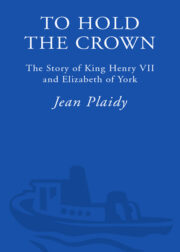Not that James gave much thought to the matter. He was inclined to let it slide out of his mind, for he was deeply involved at this time with the most beautiful woman he had ever seen. She was delightful, gentle, loving, passionate, outstandingly beautiful, and everything he liked best in a woman, and as he liked women better than anything else on Earth and had had great experience of them, this was saying a good deal. For the first time in his life—although he had often imagined himself to be in the condition on other occasions—James was truly in love.
The lady was Margaret Drummond daughter of John, first baron Drummond, a very able man who had been raised to the peerage for his services to Scotland some ten years before. He was a Privy Counsellor and justiciary of Scotland as well as the Constable of Stirling Castle, and his offices brought him to Court. With him came his beautiful daughter—a fact which caused the King to rejoice.
Marion Boyd, Janet Kennedy—delectable wenches both of them—could not compare with Margaret Drummond.
James paid constant visits to Stirling Castle where Margaret lived in the care of Sir John and Lady Lindsay. It had not taken him long to woo Margaret. Gentle, virginal . . . a little overwhelmed by so much royal favor, she had quickly fallen under the spell of the King. But perhaps, James thought ruefully, it would be more correct to say that he had fallen under hers. He could think of little else, so it was small wonder that whenever the name of Perkin Warbeck was spoken to him he felt a mild irritation.
He wanted nothing to come between him and his pursuit of Margaret. His thoughts were completely occupied by the possibility of seeing her. There was no reason why they should not be openly together. The whole of the Court knew of his infatuation—including Marion and Janet—and it was easier to face the whole of his Court than those two, particularly fiery Janet.
Who wanted war? Women were so much more enjoyable. And while Perkin Warbeck remained in Scotland he represented a threat. Henry had demanded that the young man be delivered to him. That, James had refused to do of course. Perkin had promised to restore Berwick to Scotland when he came to the throne, in payment for James’s hospitality. That would be good. Berwick was one of the most important Border towns. Certainly he wanted Berwick . . . and all the other concessions which Perkin had promised.
But promises! . . . What did they come to if wars had to be fought for the hope of their fulfilment?
No, he wanted no more now that he and Margaret had discovered each other.
He broached Perkin when they met at Linlithgow.
“It seems to me, my lord Duke,” he said, “that you are achieving little here. You do not wish to fight these people in the North . . . your own subjects, you say . . . men who had never heard of Richard Duke of York . . . or perhaps Henry Tudor.”
“I could not bear to see the blood of my own subjects shed,” said Perkin.
“I understand that well. So this is not the place for you. You have your friends in Ireland. I’ll tell you what I am going to do, my lord Duke. I am going to give you a ship. You can sail from Scotland to Ireland taking Katharine and the baby with you. I have no doubt that the Irish will rally to your cause. You will have more chance there than here in Scotland.”
Perkin was left in no doubt that this was James’s diplomatic way of telling him to leave and he had no alternative but to accept the offer of the ship and prepare to depart.
If Katharine was sad to leave her native land she did not show it.


"To Hold the Crown: The Story of King Henry VII and Elizabeth of York" отзывы
Отзывы читателей о книге "To Hold the Crown: The Story of King Henry VII and Elizabeth of York". Читайте комментарии и мнения людей о произведении.
Понравилась книга? Поделитесь впечатлениями - оставьте Ваш отзыв и расскажите о книге "To Hold the Crown: The Story of King Henry VII and Elizabeth of York" друзьям в соцсетях.